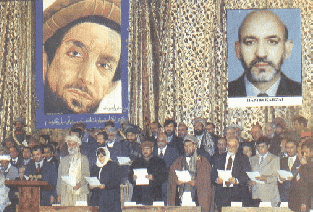




 |
|||
 |
 |
 |
 |






|
Archive: 2010 | 2009 | 2008 | 2007 | 2006 | 2005 | 2004 | 2003 | 2002 | ||||
| January 2002 | |||||
 |
Special Article 
Over 2000 delegates and observers gathered in Kabul, the capital of physically devastated country of Afghanistan on December 22, to witness the swearing-in of a new interim government, led by Hamid Karzai. The 44-year-old Karzai, a royalist and Pashtun tribal leader, was seen as the best choice to balance Afghanistan’s delicate ethnic mix. The ceremony officially heralded the end of Taleban rule in Afghanistan and also marked the formal end of the outgoing president Burhanuddin Rabbani’s tenure in power. Advance troops from the British-led multinational force provided security in the capital Hamid Karzai, chosen to lead his country during the talks in Bonn earlier in the month had arrived in the Afghan capital on December 21, after receiving the blessing and a copy of the Holy Quran in a highly symbolic gesture from the 87-year-old ex-king Mohammad Zahir Shah of Afghanistan living in Rome since his ouster from power in 1973. Karzai, said he would tackle terrorism, warlordism and the rule of the gun in a country he has to rebuild almost from scratch Mr. Karzai’s interim administration took power for six months, paving the way for a two-year transitional government Zahir Shah, who said he had given Mr. Karzai ‘lot of advice,’ is due to return home next year to open a Loya Jirga, or grand council, to map out the country’s future as part of a UN-sponsored peace plan. Shortly after Hamid Karzai was sworn in to head a six-month administration tasked with restoring peace and democracy to the nation, which has been the main battleground in a global assault against terrorism, congratulations echoed around the world. The event marked Afghanistan’s full return to the international arena after five years under the rule of the hardline Taleban Karzai, leader of the Popalzai tribe, will lead the 30-member interim government that includes representatives of several Afghan factions, gives a symbolic role to the former king and provides a multinational security force for Kabul. The task ahead for the new administration is enormous. Despite international backing and financial support, rebuilding the conflict-riddled nation remains a daunting task. Maintaining a harmonious balance of the various Afghan factions will also be tough. The United Nations special envoy to Afghanistan Lakhdar Brahimi described inauguration of an interim power-sharing government as a “momentous day” for the country. “We pray that this day will mark the end of the long dark night of confict and the dawn of peace, reconciliation and justice,” he said. Mr. Brahimi was speaking before the swearing-in of new leader Hamid Karzai. Karzai also said he would be happy with a foreign peacekeeping force of any size necessary to benefit his country Hamid Karzai takes over a country emerging from 23 years of conflict and with little respect for central authority. The 30-member cabinet which includes two women is made up of 11 Pashtuns, eight Tajiks, five Shiite Muslim Hazaras, three Uzbeks and three from other minorities. The ethnic Tajiks – who dominate the Northern Alliance that forced the Taleban out of Kabul – also dominate the cabinet. The Defence, Interior and foreign ministers – Mohammad Qasim Fahim, Yoonus Qanooni and Abdullah Abdullah – are all Tajiks from the Panjshir Valley in northern Afghanistan. Suhaila Sidiq who will be minister of Health, and Sima Samar, who is deputy leader and minister of Women’s Affairs in the interim government, will be the irst women ministers since the fall of Afghanistan’s communist regime in 1992 Loya Jirga Loya Jirga in 2002 The number of tribes and religious clerics and intellectuals who form the Loya Jirga exceed 200. |